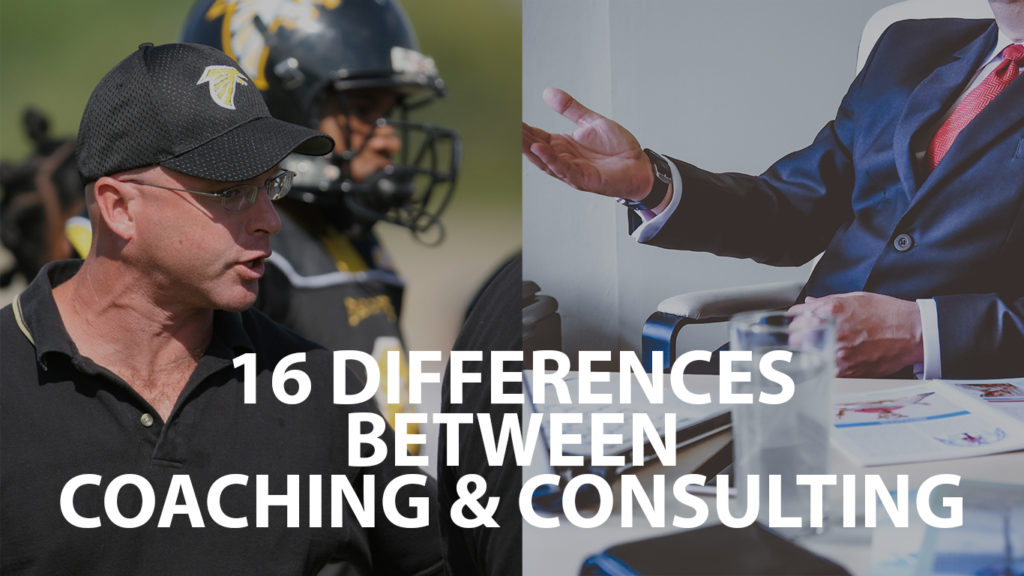Just as world-class athletes strive to get better by working with the top performers and coaches in their respective fields, more business owners than ever are looking to improve their “game” through coaching

What’s the difference between business coaching and consulting? Marketing expert Jack Trout (who, with Al Ries, originated the concept of “Positioning”), recently estimated the total revenues of the global business consulting industry at more than £30.7 billion/€34.1 billion.
With that much money being spent every year on high-priced consultants, one would guess that the return on investment for these expenditures would be highly favourable for the businesses writing those checks to the consultants. Interestingly, Trout finds otherwise.
“Levi’s spent £522 million/€581 million on Andersen Consultants to reengineer the company to serve the customer better… AT&T was reported to have spent over half a billion pounds/euros on consultants between 1989 and 1994. So, what did AT&T get for all that money? It’s now apparent that they learned very little to keep them out of trouble.” Could those companies have benefitted from a different approach?
Can a small or medium-sized business get world-class business help and advice from a different kind of business development professional?
The Rise of Business Coaching
According to the most recent statistics, more than 99% of businesses in the United States are considered “small businesses.” In the UK, more than 2.93 million businesses are in operation, the equivalent of one firm per 8.7 people of working age, an increase of 15% over the last 20 years. During that time, however, more than seven million businesses have started in the last twenty years whilst a similar number have closed.
In Australia, there were more than 2 million actively trading businesses (representing more than 97% of the Aussie businesses) that employ approximately 64 percent of Australia’s private sector labor force – and produce nearly 50 percent of the country’s domestic output.
The importance of small business for the continuing growth of market economies cannot be underestimated, however, the tools for helping these millions of business owners for years seemed out of reach. After all, which small business owner could afford to hire a consultant from McKinsey or Bain? Conversely, what McKinsey or Bain consultant would want to work with a small business?
To meet this need and “gap” of knowledge and services in the marketplace, the business coaching category started to develop in the early 1990’s as an alternative to costly and project-focused business consulting services. As one of the pioneers of the business coaching industry, ActionCOACH emerged in 1993 as a result of Brad Sugars’ work in his native Australia with small and medium-sized businesses (also known as SMEs – small-and-medium sized enterprises – or SMBs) and owners who were looking for solutions to their business challenges they could easily understand and implement – and track results.
Sugars realised his style of “consulting” was different than traditional, project-based or project-focused business help. First, SME owners needed “whole firm” solutions to their challenges, because in smaller companies, causes and effects are more easily seen and felt – by owners, employees and by profits on the bottom-line.
“Coaching” was one way to provide that “whole firm” approach, with a series of systemised tools and strategies that were implemented and refined over time based on their effectiveness and impact on the areas of an owner’s time, a company’s team and a firm’s money.
Second, Sugars saw that SME and SMB owners thrived under a working arrangement that was more relationship-based than project based, generalised more than specialised, questions-based more than “answers provided,” and in a context where both Business Coach and owner held each other accountable for results. The distinctions were subtle, yet the impact on owners and their companies were profound.
The end result was that Sugars took the advice Trout and Ries first offered in “Positioning.” If you can’t be a number one or number two company in your current category, create a new category.
As a result, the fledgling category of “Business Coaching” was taken to a new level of growth and expansion.
The Leading Company in a $1 Billion Industry
Today, the business coaching industry is growing with revenues estimated at more than £615 million/€684 million, with an annual growth rate between 20% to 40%. As a company, ActionCOACH is both the industry and category leader in terms of revenues and brand recognition, with market share approaching 30% of the industry’s total revenues.
While category leadership is one thing, the impact coaching can have on a business is something else – especially when the business belongs to you.
• Unlike a conventional consultant, an ActionCOACH can act as a business mentor and marketing advisor, a sales coach and a guide to numbers and cash flow mastery.
• In addition, an ActionCOACH will stay around to make sure systems are in place and delivering results, a level of accountability that most consultants don’t offer as part of their services.
• Finally, ActionCOACH can point to thousands of testimonials over the past two decades from hundreds of companies in virtually every business category imaginable – first-hand accounts of owners who had breakthrough success as a result of the company’s proven system of business growth and development.
Most recently, Lynn Schiff, who owns Advanced Practice Solutions, added her own story to the company’s long list of successful business owners who achieved great results working with an ActionCOACH:
“I own a recruitment and staffing firm specialising in positions for nurse practitioners and physician assistants,” she said. “We began working with ActionCOACH in March of 2007 because I felt that I needed some guidance and direction to manage the growth of my small home based business.”
At the beginning of her ActionCOACH experience, Lynn’s company posted revenues of £399,999/€444,000.
After working with ActionCOACH for the past two years, her numbers have dramatically improved.
“In 2007, we finished at £607,000/€675,000, and in 2008 we have generated £996,000/€1.4 million in sales – and that was during a recession,” she said.
“We celebrated our ten year anniversary and joined the 3% of women-owned businesses that reach over a million in sales. I would recommend ActionCOACH to any business owner or entrepreneur who is looking for guidance and willing to work hard.”
The 16 Differences Between Coaching and Consulting
Coaching
Asks questions
Focused on accountability
Paid by the program
Teacher
Generalist
Knowledge transfer
Client does the work
Life-long learning by client
Plan is driven by client’s needs
Deliverable milestones
Uses other consultants
Maintenance contracts for deliverables
A friend as long as they get paid
Client involved with initial planning and final acceptance;
Little or no industry knowledge required
Solutions come from client
Consulting
Tells the client what/how they will do it Focused on the Deliverable
Paid by the Hour
Doer
Specialist
Expertise is their value; they keep it
Consultant does the work
When consultant leaves, so does the expertise Plan is driven by deliverable definition 90 day plan Uses client’s team
Self-maintainable systems
Compassionate, unreasonable friend
Client does homework; constantly involved
otherwise little involvement. Must be an industry expert
Solution comes from consultant
Even though many owners are armed with information defining the differences between a coach and a consultant, the decision to hire a coach or a consultant may still involve an element of risk – and many owners may opt for a consultant by default. While that’s not surprising, given that business consulting is better known as a category, owners looking for more than a “quick fix” are more likely to turn to coaching for help.
With a more generalised approach marked by benchmarks and accountability, the decision for many owners when they have the option is easy: they choose a Business Coach – and the vast majority choose an ActionCOACH.
Why?
Without the level of accountability that business coaching offers, lasting change in the business is fleeting, and all the strategies and methodologies in the world are ultimately useless if an owner isn’t held accountable to put those changes into place.
While very few consultants will hold an owner accountable to achieving goals, objectives or results, very good Business Coaches always hold their clients accountable.
So, Are You Ready for Business Coaching?
As an owner, you have to ask yourself if you’re coachable – or at least willing to be coached.
• That means admitting you don’t know everything.
• It also means being willing to implement new and sometimes uncomfortable ideas for you and your company.
• You also need to be willing to do the work necessary to grow the company. Why?
Because unlike a consultant who may do a project and leave, your Business Coach will educate you on strategy and process – and leave it to you to implement.
Your coach won’t do the work, but will expect the work to get done.
For the coaching process, that’s where accountability comes in and is key to your achievement and your company’s ultimate success.
Your Next Step
If you are interested in improving your company at every level, business coaching may be the right fit for you.
Just as world-class athletes strive to get better by working with the top performers and coaches in their respective fields, more business owners than ever are looking to improve their “game” through coaching.
Just contact us (Andy Hemming’s team) for more information about how to hire a coach, or about group coaching events in your area.
Like a good athletic coach, a good business coach will push you to perform.
If you are ready to take your business to the next level, ActionCOACH is too – and will help you achieve the success you want for you and your company.





